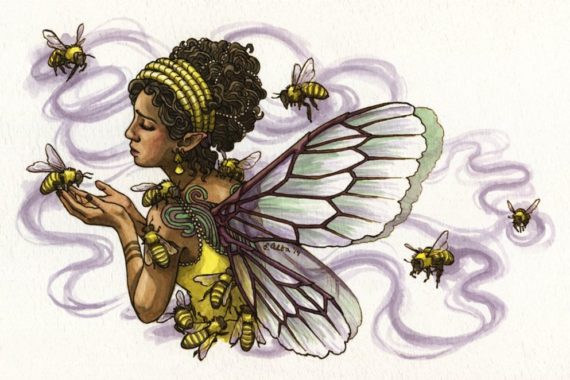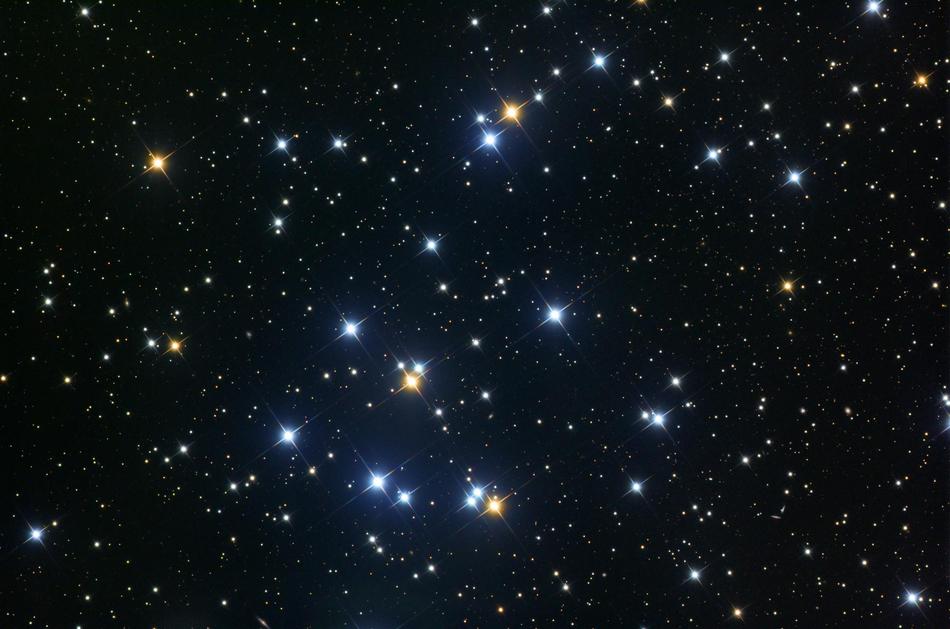THE SOUTHWORTH PLANETARIUM
70 Falmouth Street Portland, Maine 04103
(207) 780-4249 usm.maine.edu/planet
43.6667° N 70.2667° W
Altitude: 10 feet below sea level
Founded January 1970
2021-2022: CXXX
"To be yourself in a world that is constantly trying to make you something else is the greatest accomplishment." -Ralph Waldo Emerson
THE DAILY ASTRONOMER
Thursday, May 26, 2022
The Mythology and Astronomy of Bees
It was considered to be among the happiest of times on Olympus and, believe you me, that's saying something. Endowed with perpetual youth, undiminished beauty, inexhaustible wealth, and prodigious vigor, the twelve Olympians existed largely free of care. Having just defeated the ferocious Titans in a decade-long conflict known as the Titanomachy, the Olympians' bliss was even unperturbed by contemplations of future battles. After all, their most formidable enemies had been vanquished and were all safely confined to Tartarus, the Underworld's punitive and most dreaded region. The gods had assumed masterful dominion of the Universe and resided at its apex, a realm redolent of every floral fragrance, softened by unwavering vernal warmth and poised just below boundless crystal blue skies. And now, as our story begins, Zeus, the newly appointed King of the Gods, was due to marry Hera, his sister and the goddess of marriage. (Yes, such close incestuous unions seem distasteful to us mortals. However, one must remember that the Olympians were few in number and so their choice of mates was severely limited.)
It seemed as though all beings within the heavens and Earthly realm were united in a state of joyous excitement at the impending nuptials. Miles of garland were hung, gilded altars constructed, while droves of all creatures mighty or minuscule danced, sang and celebrated in order to pay homage to the loveliest of brides and grandest of grooms. Apollo composed ballads of such excruciating beauty that even the stones wept to hear them while Posiedon calmed the seas so that even the ocean beings could witness the most blessed of all unions. (Mind you, this was all before Zeus transformed into an incorrigible philanderer and Hera, in response, changed into a brooding, long-suffering wife.)
Just before the ceremony, Zeus announced that a contest would be held. "Everyone is invited to proffer food for our wedding feast," he declared. "And, I swear by the River Styx that the one who produces the tastiest dish will be granted one wish." Well, the unbridled enthusiasm that all beings exhibited before was as nothing to the frenzy that attended this announcement. Everything and everyone hastily prepared food for the feast. Not only did every participant desire a wish, but they all yearned to curry the favour of Zeus and Hera.
After the most glorious wedding ceremony the world had ever seen ended, the gods withdrew to an unfathomably massive dining hall built by Hephaestus, himself. All manner of food had been set along a dining table so large that those who stood at one end saw the other end as little more than a tapering speck of glistening gold. Zeus and Hera led a procession of guests down this table. The newlyweds sampled each dish: the heron's crimson jelly, the fox's sugar cakes, the muses' ambrosia and all the other offerings, except of course, for Hades' tar snaps and the Cyclops' pickled sailor. All of these other dishes were quite lovely, they decided, but nothing seemed remarkable until they finally came to a small little pot filled with what resembled liquid sunshine. Hera dipped her finger into the pot and licked it. "My love," she said, dipping her finger back into the teeny cauldron, "what think you of this?" She playfully pressed her finger into Zeus' mouth. His confused expression brightened into one of ecstasy. "This is exquisite! Most extraordinary! Who is responsible for such a sublime dish?"
At this, a fidgety nymph named Melissa came forward and bowed. "The dish is all mine. Was it to your liking?"
"It was, indeed," Zeus replied with a thunderous laugh. "Your dish far surpasses the others.What do you call this food?"
"Honey."
"Well, I declare you the winner. You shall have your wish."
On later reflection, Melissa the fidgety nymph wished that she had simply said "thank you" before stating her wish. Of course, if Melissa the fidgety nymph had been so polite and concise, she wouldn't have been Melissa the fidgety nymph.
"Oh, well, yes, I dare say I deserve that wish, what with the trouble I go through to make that honey. You won't remember this, naturally, but I was in attendance when you were being raised in that cave. Yes, well, the goat maiden Amalthea receives all the credit, of course, what with her and that cornucopia and ample supplies of nectar. But, I was there, too, cowering in her shadow and moistening your lips with my honey: the honey that I made drop by drop by drop by flitting to this flower and then that flower and to the other one, oh, but there's no end to my labour. Well, how would you lot know about that, as if gods ever labor. Just frolic about looking pretty and losing their tempers at the slightest slight...must be nice to live like that....but I don't, what with the trouble I go through to make the...."
"And, your wish?" Zeus asked, his beaming smile having transmogrified into a tight grimace.
"Oh, the wish, oh, yes that, well, let's see, there is so much I need, what with me being just a humble, little nymph...not that you'd understand, you being a god and everything handed to you and all..well, I don't need faster wings, that's for certain. I am the fastest thing around, save Hermes, of course. I thought he and I should race sometime, but he seems to avoid me for some reason, I'm not quite sure wh...oh, let's think, now...how many wishes do I get?"
"ONE!" Zeus barked thunderously. The cacophony of chattering and laughter vaporized into silence.
"Oh, yes, of course, I knew that. Oh, come now," Melissa said absently as she drummed her wing on her chin. "Let me think...oh, yes! I know. Well, Zeus, I don't know if you realize all the trouble I go through to make this honey that you and your lady just gobbled up like starving bear cubs. Well, I do go to a lot of trouble and so often the honey is taken from me...a bird swoops down or a hound slurps it...there is just no end to the beasts and miscreants you lot put into the world. I think I would like a fatal sting so whenever one of these creatures gets near my honey stores, I can strike it down dead with a single touch. Yes, that is my wish. So, how bout it?"

Zeus was in a bit of a quandry. His mood had just nosedived from euphoric to despairing within the first ten syllables of Melissa's response and so was not inclined to be cooperative. However, he did swear by the River Styx to grant the winner one wish. If he had decided to break that promise, he would have been consigned to Tartarus where he'd not only be rendered feeble, but would also suffer ineluctable torments for seven times seventy years. (A fate that, as he would later realize, was a shade less agreeable than his marriage to Hera.) On the other hand, he was highly concerned about giving Melissa the power to kill. He could just see her wielding that sting to slay anything and everything that just happened to encroach on her territory or, heaven forfend, interrupt her stream of consciousness. Then, he had what he considered a brilliant idea. His empurpled face widened into a malicious smile. "You shall have your fatal sting," he declared. "However, that sting will also be fatal to yourself, so you'd be wise not to exercise that power indiscriminately."
Melissa went flush. "Oh, dear...."
Much later, when his ardor cooled, he somewhat regretted his decision about Melissa's suicidal sting. Although he didn't reverse her condition, he did give her the power to procreate, which she did with wild abandon. The offspring became the bees. All of them were equipped with a single suicidal sting. However, each generation matured and reproduced so quickly that honey flowed freely throughout the world, much to the delight of mortals and to the gods, who would occasionally convey some of it up to Olympus. Melissa, having never used the sting after all, ultimately died of old age. After she died, Zeus placed her and a swarm of her drones in the sky as the Beehive Star Cluster, also known as Praesepe.

Located approximately 610 light years from Earth, Prasepe is a galactic or open star cluster marking the center of Cancer the Crab. In fact, the Beehive Star Cluster serves as Cancer's only truly prominent feature as the rest of it consists of faint stars arranged in an inverted "y" shape. Although the above image, compliments of Sun.org, shows dozens of stars, the cluster consists of more than 1000, most of which, unlike those A-type blues appearing above, are faint red dwarfs.
Formed approximately 700 million years ago from a vast nebula, the stars comprising Praesepe are all slowly dissipating. Within the next billion years, the cluster's gravitational hold on its members will become increasingly more tenuous so that they will each establish their own trajectories through space. The Sun, itself, was once part of such a cluster that has long since dissipated.
In the sky, the Beehive Star Cluster resembles a faint, circular cloud. This time of year, it begins the night high in the western sky. The cluster is aligned along the ecliptic, the Sun's annual path across the firmament. It marks the Sun's approximate position during the first few days of August. Over the next few weeks Praesepe will draw progressively closer to the setting Sun each day. By mid-July, the beehive will vanish into the dusk, only to return to the pre-dawn eastern sky by early October.
Look for Melissa and her drones in the western sky tonight. Though faint, these bees are a beguilingly beautiful addition to our spring/summer evening sky. They fly gracefully through the heavens seeking nectar and making honey. And, all the while, to Zeus' delight, they remain completely silent.
To subscribe or unsubscribe from the Daily Astronomer: